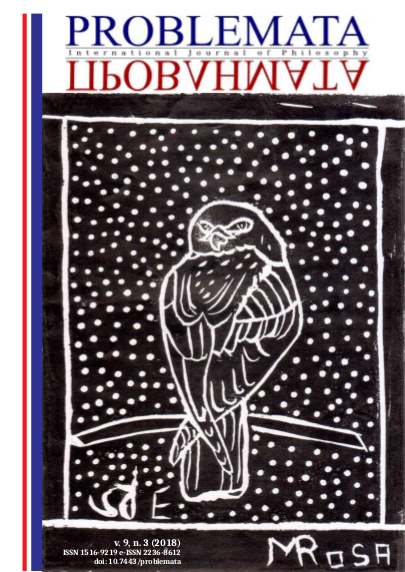THE FOUNDATIONS OF PHILOSOPHY TEACHING IN THE DIDATIC BOOKS APPROVED BY PNLD 2018
DOI:
https://doi.org/10.7443/problemata.v9i3.41670Keywords:
Didatic books – philosophy. PNLD 2018. Philosophy teaching.Abstract
In 2018, in Brazil, one of the eight Philosophy didatic books approved by PNLD (National Didatic Book Program) was distributed free in public schools to those enrolled in high school - for each school, a choice. The year before, in 2017, we can, as teachers, to make the choice of the book that would be adopted at the school where we work. We resolve to transform, at that time, our analysis of the “Manual do Profess we were authorized or” of the eight works approved by PNLD in this publication. We had as general objective to identify the fundamentals of the teaching of Philosophy in the middle level (high school), presented in the supplements of the manuals of the teacher directed to the teachers. More specifically: to describe the conceptions presented sobre what Philosophy is; to locate the fundamentals of teaching and learning Philosophy; More specifically: to describe the conceptions presented about what Philosophy is; to locate fundamentals of teaching and learning Philosophy; to discuss arguments about the importance of teaching Philosophy. Among the most common ideas that underlie the teaching of Philosophy are: emphasize the importance and necessity relation between philosophizing and Philosophy; in defense of the importance of Philosophy as legacy of the past; recognition of Philosophies and not a Philosophy; reference to the specific competences of Philosophy evidenced in the National Curricular Parameters.
Downloads
References
ARANHA, Maria Lúcia de Arruda; MARTINS, Maria Helena Pires. Filosofando: introdução à Filosofia. São Paulo: Ed. Moderna, 2016.
BRASIL. Lei Nº 13.415, de 16 de Fevereiro de 2017. Brasília, 16 fev. 2017. Conhecida como Reforma do Ensino Médio. Disponível em: <http://www.planalto.gov.br/ccivil_03/_Ato2015-2018/2017/Lei/L13415.htm#art3>. Acesso em: 20 jul. 2017.
BRASIL. Lei Nº 9.394, de 20 de Dezembro de 1996. Brasília, 20 dez. 1996. Conhecida como Lei de Diretrizes e Bases da Educação Nacional. Disponível em: <http://www.planalto.gov.br/ccivil_03/leis/L9394.htm>. Acesso em: 30 maio 2017.
BRASIL. PNLD. FNDE. Edital de convocação 04/2015 – CGPLI: edital de convocação para o processo de inscrição e avaliação de obras didáticas para o programa nacional do livro didático PNLD 2018. 2015. Disponível em: http://www.fnde.gov.br/programas/programas-do-livro/consultas/editais-programas-livro/item/7932-pnld-2018 Acesso em: 02 nov. 2017.
CHAUÍ, Marilena. Iniciação à Filosofia. São Paulo: Ática, 2016.
COTRIM, Gilberto; FERNANDES, Mirna. Fundamentos de Filosofia. São Paulo: Saraiva, 2016.
FIGUEIREDO, Vinicius de (Org.). Filosofia: temas e percursos. São Paulo: Berlendis & Vertecchia, 2016.
GALLO, Sílvio. Filosofia: experiência do pensamento. São Paulo: Scipione, 2016.
GONTIJO, Pedro. O ensino de Filosofia no Brasil: algumas notas sobre avanços e desafios. Perspectivas, [s.l], v. 2, n. 1, p.3-17, junho 2017. Disponível em: <https://sistemas.uft.edu.br/periodicos/index.php/perspectivas/article/view/3736>. Acesso em: 20 jul. 2017.
MELANI, Ricardo. Diálogo: primeiros estudos em Filosofia. São Paulo: Moderna, 2016.
SAVIAN FILHO, Juvenal. Filosofia e Filosofias: existência e sentidos. Belo Horizonte: Autêntica Editora, 2016.
VASCONCELOS, José Antonio. Reflexões: Filosofia e cotidiano. São Paulo: Ed. SM, 2016.
Downloads
Published
Issue
Section
License
Authors who publish with this journal agree to the following terms:
- Authors retain copyright and grant the journal right of first publication with the work simultaneously licensed under a Creative Commons Attribution License that allows others to share the work with an acknowledgement of the work's authorship and initial publication in this journal.
- Authors are able to enter into separate, additional contractual arrangements for the non-exclusive distribution of the journal's published version of the work (e.g., post it to an institutional repository or publish it in a book), with an acknowledgement of its initial publication in this journal.
-
- Authors are permitted and encouraged to post their work online (e.g., in institutional repositories or on their website) prior to and during the submission process, as it can lead to productive exchanges, as well as earlier and greater citation of published work (See The Effect of Open Access).





